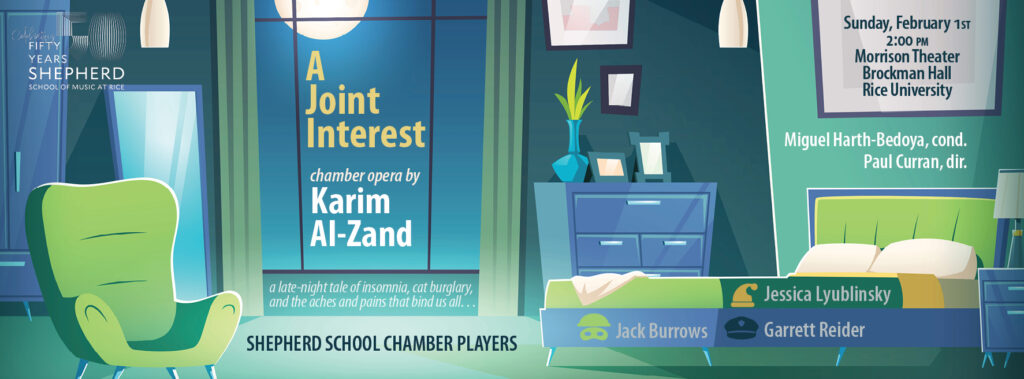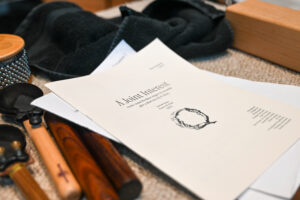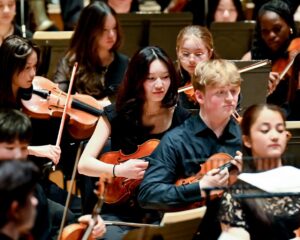A Joint Interest premiere for Shepherd School’s 50th Anniversary
- On January 26, 2026
- By alzand@rice.edu
- In EVENTS, News, Performances
 0
0
 The chamber opera A Joint Interest was commissioned by the Shepherd School of Music (with funding assistance from Rice University Office of Research) on the celebratory occasion of the school’s 50th anniversary. Its premiere performance on Sunday, February 1st, 2pm will take place in the Morrison Theater of Brockman Hall at Rice University.
The chamber opera A Joint Interest was commissioned by the Shepherd School of Music (with funding assistance from Rice University Office of Research) on the celebratory occasion of the school’s 50th anniversary. Its premiere performance on Sunday, February 1st, 2pm will take place in the Morrison Theater of Brockman Hall at Rice University.
Two Songs published by Subito Music
- On January 09, 2026
- By alzand@rice.edu
- In News
 0
0
 Two Songs, for voice and piano, has just been published by Subito Music in an artsong collection entitled Standing Still, Still Standing. The songs were commissioned during the pandemic by Mezzo-Soprano Susanne Mentzer, on poetry by performer, poet, and philanthropist Reg Huston. The volume also includes songs of Stephen Bachicha, Michael Ching, Kurt Erikson, Daron Hagen, Jason Hainsworth, Tammy L. Hall, Jake Heggie, Libby Larsen, Andre Myers, Richard Pearson Thomas, and Hilary Purrington.
Two Songs, for voice and piano, has just been published by Subito Music in an artsong collection entitled Standing Still, Still Standing. The songs were commissioned during the pandemic by Mezzo-Soprano Susanne Mentzer, on poetry by performer, poet, and philanthropist Reg Huston. The volume also includes songs of Stephen Bachicha, Michael Ching, Kurt Erikson, Daron Hagen, Jason Hainsworth, Tammy L. Hall, Jake Heggie, Libby Larsen, Andre Myers, Richard Pearson Thomas, and Hilary Purrington.
National Youth Orchestra of Great Britain performs City Scenes
- On January 06, 2026
- By alzand@rice.edu
- In EVENTS, News, Performances, Reviews/Press
 0
0
The National Youth Orchestra of Great Britain, under conductor Alexandre Bloch, kicked off their Shimmer tour—a program which includes City Scenes—with a performance at the Barbican Center on January 5th. Concerts in Warwick Centre (January 6) and Nottingham Royal Concert Hall (January 7th) will follow. Reviewers from The Guardian, Times and Telegraph tripped over themselves to compare the music to dead composers they have ready notions about (America + Orchestra + Jazz = Bernstein!). UPDATE more reviews: reviewsgate.com and A Young(ish) Perspective. PLUS three, more reviews.
“The Bernstein-brash, neon blare of Karim Al-Zand’s 2006 City Scenes introduced new swagger, a cheeky little phrase hopping around the orchestra like a sonic Artful Dodger, and strings and harps a gleaming foil to streetwise brass and woodwind.”
The Guardian
“…urban, Bernstein-ish sound of City Scenes, by Tunisian-born American composer Karim Al-Zand was a breeze, and the delicately “wrong-note” solos from a handful of violins in the dreamy slow movement had a deliciously louche quality.”
The Telegraph
…with plenty of chewy textures for the players — and some nifty solo work slickly delivered by the orchestra’s leader Aki Blendis — and driven rhythms that have a hint of Shostakovich, but a Shostakovich who has been airlifted from Moscow and taken to Miami for a weekend.
The Times of London
City Scenes performed by National Youth Orchestra of the UK
- On December 27, 2025
- By alzand@rice.edu
- In EVENTS, News, Performances
 0
0
The National Youth Orchestra of Great Britain, under conductor Alexandre Bloch, will perform City Scenes as part of their Shimmer program, in three New Year London concerts: Barbican Centre (January 5), Warwick Centre (January 6) and Nottingham Royal Concert Hall (January 7th).
Jonathan Mak: Pattern Preludes, book 1
- On December 02, 2025
- By alzand@rice.edu
- In Performances
 0
0
A new film and recording by Canadian pianist Jonathan Mak of my Pattern Preludes, book 1, recorded at the Isabel Bader Centre for the Performing Arts in Toronto.



